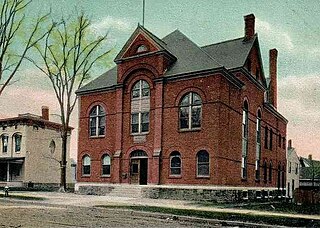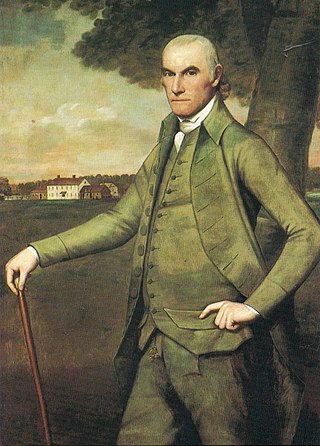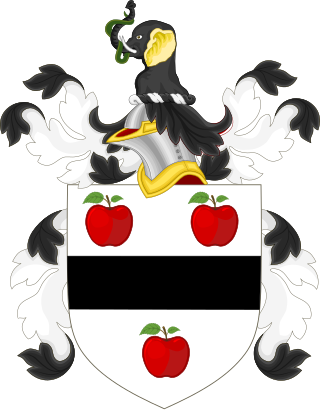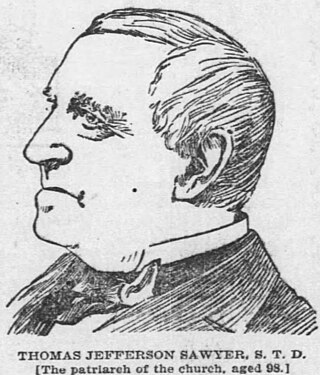Related Research Articles

Augusta is a town in Oneida County, New York, United States. The population was 2,021 at the 2020 census.

Clinton is a village in Oneida County, New York, United States. The population was 1,942 at the 2010 census, declining to 1,683 in the 2020 census 13% decline). It was named for George Clinton, the first Governor of New York.

Kirkland is a town in Oneida County, New York, United States. The population was 10,075 at the 2020 census. The town is named after Samuel Kirkland, a missionary among the Oneidas.

New Hartford is a town in Oneida County, New York, United States. As of the 2020 census, the town population was 21,874. The name of New Hartford was provided by a settler family from Hartford, Connecticut.

William Floyd was an American Founding Father, wealthy farmer, and political leader from New York. Floyd served as a delegate to the Continental Congress and was a signer of the Continental Association and Declaration of Independence. In August 1776, a few weeks after the Declaration was signed, the British Army overran Long Island, confiscated Floyd's house and estate, and used the property as a base for its cavalry over the next seven years. Floyd remained active in politics throughout the Revolutionary Era, served as a major general in the New York State militia, and was elected to the first U.S. Congress in 1789.

Hamilton College is a private liberal arts college in Clinton, New York. It was originally established as the Hamilton-Oneida Academy in 1793 and later received its charter as Hamilton College in 1812, in honor of Alexander Hamilton, one of its inaugural trustees, following a proposal made after his death in 1804. Since 1978, Hamilton has been a coeducational institution, having merged with its sister school, Kirkland College.

Samuel Kirkland was a Presbyterian minister and missionary among the Oneida and Tuscarora peoples of present-day central New York State. He was a long-time friend of the Oneida chief Skenandoa.
Richard Eddy, D.D. was an American Universalist clergyman, born at Providence, R. I. He was a chaplain of the Sixtieth New York Volunteers during the American Civil War. From 1877 to 1906 he was president of the Universalist Historical Society and from 1886 to 1891 he was editor of the Universalist Register.
More than 1,500 African American officeholders served during the Reconstruction era (1865–1877) and in the years after Reconstruction before white supremacy, disenfranchisement, and the Democratic Party fully reasserted control in Southern states. Historian Canter Brown Jr. noted that in some states, such as Florida, the highest number of African Americans were elected or appointed to offices after the end of Reconstruction in 1877. The following is a partial list of notable African American officeholders from the end of the Civil War until before 1900. Dates listed are the year that a term states or the range of years served if multiple terms.
The Breckinridge family is a family of public figures from the United States. The family has included six members of the United States House of Representatives, two United States Senators, a cabinet member, two ambassadors, one United States Vice President, and one unsuccessful candidate for United States President. Breckinridges have served as college presidents, prominent ministers, soldiers, and theologians and in important positions at state and local levels. The family was most notable in Kentucky and most prominent during the 19th century, during nearly one third of which a member of the family served in the United States Congress.
John Skenandoa, also called Shenandoah among other forms, was an elected chief of the Oneida. He was born into the Iroquoian-speaking Susquehannocks, but was adopted into the Oneida of the Iroquois Confederacy. When he later accepted Christianity, he was baptized as "John", taking his Oneida name Skenandoa as his surname. Based on a possible reconstruction of his name in its original Oneida, he is sometimes called "Oskanondonha" in modern scholarship. His tombstone bears the spelling Schenando.
Rev. Asahel Norton Homestead is a historic home and farm complex located at Kirkland in Oneida County, New York.

The Oneida Institute was a short-lived (1827–1843) but highly influential school that was a national leader in the emerging abolitionist movement. It was the most radical school in the country, the first at which black men were just as welcome as whites. "Oneida was the seed of Lane Seminary, Western Reserve College, Oberlin and Knox colleges."

Thomas Whittemore was a Christian Universalist author, speaker and influential member of the Universalist Church of America. He founded and was the editor of The Trumpet and Universalist magazine, which succeeded the Universalist magazine of Hosea Ballou in 1828.

Caroline A. Soule, was an American novelist, poet, religious writer, editor, and ordained Universalist minister, who was in 1880 the first woman to be ordained as a minister in the United Kingdom; first president and one of the founders of the Woman's Centenary Aid Association, the earliest national organization of American church women; and the first Universalist Church of America missionary when sent to Scotland in 1878.

The Clinton Liberal Institute was a preparatory boarding school established by the Universalist Church in the village of Clinton, in the Town of Kirkland, New York, in 1831. Its main building, a massive stone structure, was the largest building in Clinton for many years. It relocated to Fort Plain, New York, in 1878, taking over the former Fort Plain Seminary, and remaining there until its buildings were destroyed in a fire in 1900.

Caroline M. Sawyer was a 19th-century American poet, writer, and editor. Her writings ranged through a wide variety of themes. Born in 1812, in Massachusetts, she began composing verse at an early age, but published little till after her marriage. Thereafter, she wrote much for various reviews and other miscellanies, besides several volumes of tales, sketches, and essays. She also made numerous translations from German literature, in prose and verse, in which she evinced an appreciation of the original. Sawyer's poems were numerous, sufficient for several volumes, though they were not published as a collection.

The Appleton family is an American political, religious and mercantile family.

Thomas Jefferson SawyerS.T.D. LL.D. was an American Universalist minister and educator.
References
- ↑ Gridley, A. D. (Amos Delos) 4n (February 22, 1874). "History of the town of Kirkland, New York". New York : Hurd and Houghton, 1874 – via Internet Archive.
{{cite web}}: CS1 maint: numeric names: authors list (link) - ↑ Durant, Samuel W. (February 22, 1878). "History of Oneida County, New York : with illustrations and biographical sketches of some of its prominent men and pioneers". Philadelphia : Everts & Fariss – via Internet Archive.
- ↑ Sawyer, Thomas J. (Thomas Jefferson) (February 22, 1852). "Memoir of Rev. Stephen R. Smith". Boston, A. Tompkins – via Internet Archive.
This article needs additional or more specific categories .(June 2024) |